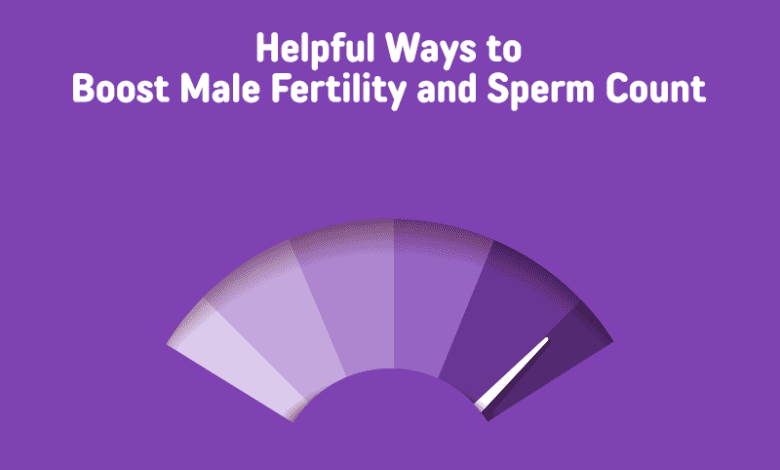Helpful Ways to Boost Male Fertility and Sperm Count

Helpful Ways to Boost Male Fertility and Sperm Count : Male fertility is as complex as female fertility and depends on a number of factors. Sperm count is one of them and is often overlooked by individuals suffering from infertility. Sperm count is the average number of sperm found in one sample of sperm. Fertility specialists consider sperm count to be an essential factor in fertility during standard sperm examinations. According to World Health Organization (WHO), a sperm count of 15 million per millilitre (ml) is a healthy sperm count. A sperm count lower than this is deemed as low count and may be a reason behind male infertility.
However, by making lifestyle changes, adopting healthy habits, and taking certain medications one can improve sperm count. This blog discusses the most helpful ways to boost sperm count.
Signs of Low Sperm Count
Some men may suffer from the following symptoms denoting low sperm count:
- Decreased sex drive
- Having difficulty obtaining or keeping an erection
- A reduction in face or body hair
- In or around the testicles, you may experience pain, swelling, or a lump.
It should be kept in mind that these symptoms do not always mean that a person is suffering from infertility. A fertility expert will be the right person to consult in case you experience any of the above-mentioned symptoms.
Tips to Boost Sperm Count and Male Fertility
Exercise
Aside from being helpful for your overall health, regular exercise can increase testosterone levels and promote fertility in men. Several studies back up this claim as they suggest a positive relationship between exercising and male fertility. Men who exercise regularly have better semen quality and higher testosterone levels. Despite this, rigorous exercise is not recommended as it can have negative effects on male fertility. Exercising also helps people with obesity lose weight and achieve an ideal body mass index (BMI). Being overweight too impacts the overall quality and quantity of sperm, thus adding to infertility troubles.
Quit Smoking
Smoking cigarette is injurious to health and also has a negative impact on male fertility. Cigarette smokers are more likely to have poor sperm counts. There are enough reasons to quit smoking as soon as possible. If you are already suffering from infertility issues or are hoping not to have any such issues in the future then it is time for you to quit smoking. Studies have revealed that smoking adversely has an impact on sperm count, sperm shape and motility. Smoking not only reduces your sperm count but also minimizes the chances of successful fertility treatment such as in vitro fertilization (IVF).
Build a Balanced Diet
Diet plays a vital role in our overall health, including fertility. Food is the primary source to obtain essential nutrients for the body. Our health depends on these nutrients, meaning a healthy diet is a must. No solid data is available that establishes a clear relationship between diet and fertility. But there is no harm in building a balanced diet and following it regularly. Choose lean protein sources such as fish and poultry, plenty of fresh vegetables and fruits, healthy fats such as olive oil and nuts, and whole grains. If you are unsure about following a particular diet then consult a fertility expert who will assist you.
Treat Underlying Medical Conditions
As mentioned earlier, fertility is affected by multiple factors. Certain conditions may affect the sperm count in men if left untreated. Conditions such as diabetes negatively affect reproductive health in men which may further complicate infertility. Infertility in men can also be a result of an untreated infection of the reproductive system or urinary tract. Sexually transmitted diseases (STIs), for example, might impair sperm motility. Repeated infections can result in scarring, which can obstruct the passage of sperm. If you are ready to begin trying to conceive, it is a good idea to schedule a check-up with a healthcare provider in case you are suffering from some conditions.
Avoid Excessive Alcohol and Drug Use
Excessive alcohol reduces fertility. If you’re trying to conceive, it might be a good idea to reduce, or even eliminate, your alcohol use. Higher alcohol consumption decreases sperm counts, less normally shaped sperm, and poor sperm motility. Some research reveals that moderate consumption of alcohol has no adverse effect on the fertility of men. Meanwhile, excess drinking is related to poor sperm health and decreased fertility.
In a similar way, the drug is also bad for sperm health in men. Marijuana significantly lowers sexual drive and sperm count. Long-term opioid usage impairs testosterone production and reduces sperm quality and quantity. Cocaine, anabolic steroids, and other similar drugs should also be avoided because they have a negative impact on fertility.
Don’t Forget Vitamins
A fertility doctor would know best if you are lacking any vitamins that are affecting your sperm count. Sperm analysis and other tests will paint a clear picture. Vitamins such as D, E, C and CoQ10 are vital for sperm health in males. An adequate intake of vitamin C daily improves sperm mobility and concentration. This will make it easier for the sperm to move effectively. A low level of vitamin D is also linked with the lesser success of pregnancy among couples trying to conceive. Similarly, calcium also plays a major role in improving sperm count.
Cut Off Caffeine
Caffeine is good to keep oneself active in the morning or while working. However, excess caffeine is not suitable for our bodies. These days caffeine is present in most of the drinks we consume, including coffee, tea, soft drinks, and energy drinks. However, limiting caffeine intake is essential because high levels of caffeine cause complications during pregnancy. Some evidence suggests that a higher caffeine level affects men as well. So, it is best to limit caffeine consumption to the recommended level only.
Manage stress
It’s difficult to get in the mood when one is feeling stressed, but there could be more to it than just not feeling up for sex. Stress can decrease sexual enjoyment and affect fertility. Cortisol, according to researchers, may explain some of the negative impacts of stress. Prolonged stress boosts cortisol levels, which have a substantial detrimental impact on testosterone. When cortisol levels rise, testosterone levels fall.
While medicine is usually used to address severe, inexplicable anxiety, relaxing techniques can help with milder forms of stress. Stress reduction can be as simple as going for a walk, meditating, exercising, reading books and spending time with friends.
Seek Treatment to Boost Fertility
Infertility is a lot more common than you might think. It affects men too. In fact, one-third of the fertility cases are related to men only. The tips discussed earlier were meant to bring lifestyle changes and shift to healthy habits. Following these tips may help men improve their sperm count and boost overall fertility.
However, these were general ways that usually can help most of the men out there but might not hold true in your individual case. Luckily, fertility treatments and tests are widely available to help men suffering from infertility. Banker IVF center in Ahmedabad offers sophisticated fertility treatments for both me and women. The semen analysis test helps determine male fertility before moving ahead with the procedures.
The expertise of Dr Manish Banker has helped numerous couples conceive through treatments such as in vitro fertilization (ART) and other assisted reproductive technology. So, if you or your partner are battling infertility then Banker IVF hospital in Ahmedabad is the right place to seek treatment!





